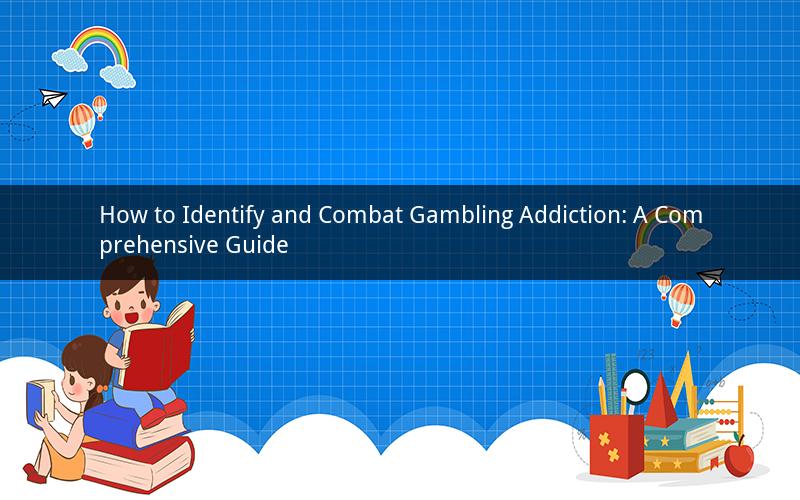
Gambling addiction, often referred to as compulsive gambling or problem gambling, is a serious issue that affects millions of people worldwide. Recognizing the signs of gambling addiction is crucial in order to seek help and support. This article delves into the various aspects of gambling addiction, providing an in-depth understanding of how to identify it and the steps to take to overcome it.
Understanding Gambling Addiction
Gambling addiction is characterized by an uncontrollable urge to gamble, despite the negative consequences it may have on one's life. It is important to differentiate between casual gambling and problem gambling. While occasional gambling is a common pastime, problem gambling involves a pattern of behavior that significantly disrupts an individual's personal, financial, or professional life.
Signs of Gambling Addiction
1. Loss of Control: A key sign of gambling addiction is the inability to control the urge to gamble. Individuals may find themselves spending more time and money on gambling than intended, even when they know the consequences.
2. Preoccupation: Gambling addiction often leads to preoccupation with thoughts of gambling. This may manifest as constant planning or thinking about gambling activities, even when not engaged in them.
3. Lying: Individuals with gambling addiction may lie to friends, family, or colleagues about their gambling habits to hide the extent of their problem.
4. Financial Problems: Problem gambling can lead to significant financial difficulties, including debt, loss of savings, and financial strain on loved ones.
5. Relationship Issues: The consequences of gambling addiction can strain relationships with family and friends. Individuals may become isolated and withdraw from social activities.
6. Legal Issues: Compulsive gamblers may engage in illegal activities to fund their gambling habits, such as theft or fraud.
7. Health Problems: Gambling addiction can lead to various physical and mental health issues, including anxiety, depression, and insomnia.
Identifying Risk Factors
Several risk factors can contribute to the development of gambling addiction. Understanding these factors can help in identifying individuals who may be at a higher risk:
1. Genetic Predisposition: Research suggests that genetics play a role in gambling addiction, with certain individuals having a higher susceptibility to develop the disorder.
2. Mental Health Disorders: Individuals with certain mental health conditions, such as depression, anxiety, or bipolar disorder, may be more vulnerable to gambling addiction.
3. Environmental Factors: Exposure to gambling opportunities, such as living near casinos or experiencing gambling in early life, can increase the risk of developing an addiction.
4. Personality Traits: Certain personality traits, such as impulsivity and sensation-seeking, may contribute to the development of gambling addiction.
Seeking Help and Support
Recognizing the signs of gambling addiction is the first step towards seeking help. Here are some resources and support options available:
1. Counseling: Professional counseling can provide individuals with the tools and strategies to overcome their gambling addiction. Therapy may include cognitive-behavioral therapy (CBT) or other evidence-based approaches.
2. Support Groups: Joining a support group, such as Gamblers Anonymous, can provide individuals with a community of individuals facing similar challenges. Support groups offer a safe space to share experiences and receive encouragement.
3. Treatment Programs: Residential or outpatient treatment programs can help individuals address their gambling addiction and develop healthy coping mechanisms.
4. Financial Counseling: For individuals struggling with financial difficulties due to gambling, financial counseling can help develop a plan to manage debt and improve financial stability.
5. Self-help Strategies: Self-help strategies, such as setting strict gambling limits, avoiding triggers, and seeking support from loved ones, can also be effective in managing gambling addiction.
Frequently Asked Questions
1. Q: Can gambling addiction be cured?
A: Yes, gambling addiction can be treated and managed effectively. With the right support and resources, individuals can overcome their addiction and lead a healthier, more fulfilling life.
2. Q: Is there a cure for gambling addiction?
A: There is no single cure for gambling addiction, but various treatment approaches, including counseling, support groups, and self-help strategies, can help individuals manage their addiction.
3. Q: How long does it take to recover from gambling addiction?
A: The duration of recovery from gambling addiction varies from person to person. Some individuals may experience immediate improvements, while others may require ongoing support and treatment for several years.
4. Q: Can someone who has overcome gambling addiction relapse?
A: Yes, individuals who have overcome gambling addiction can relapse. It is important to remain vigilant and seek support if symptoms of addiction reemerge.
5. Q: What should I do if I suspect someone I know has a gambling addiction?
A: If you suspect someone you know has a gambling addiction, encourage them to seek help and support. Offer to accompany them to counseling sessions or support groups. Be understanding and non-judgmental, as empathy and support can make a significant difference in their recovery journey.